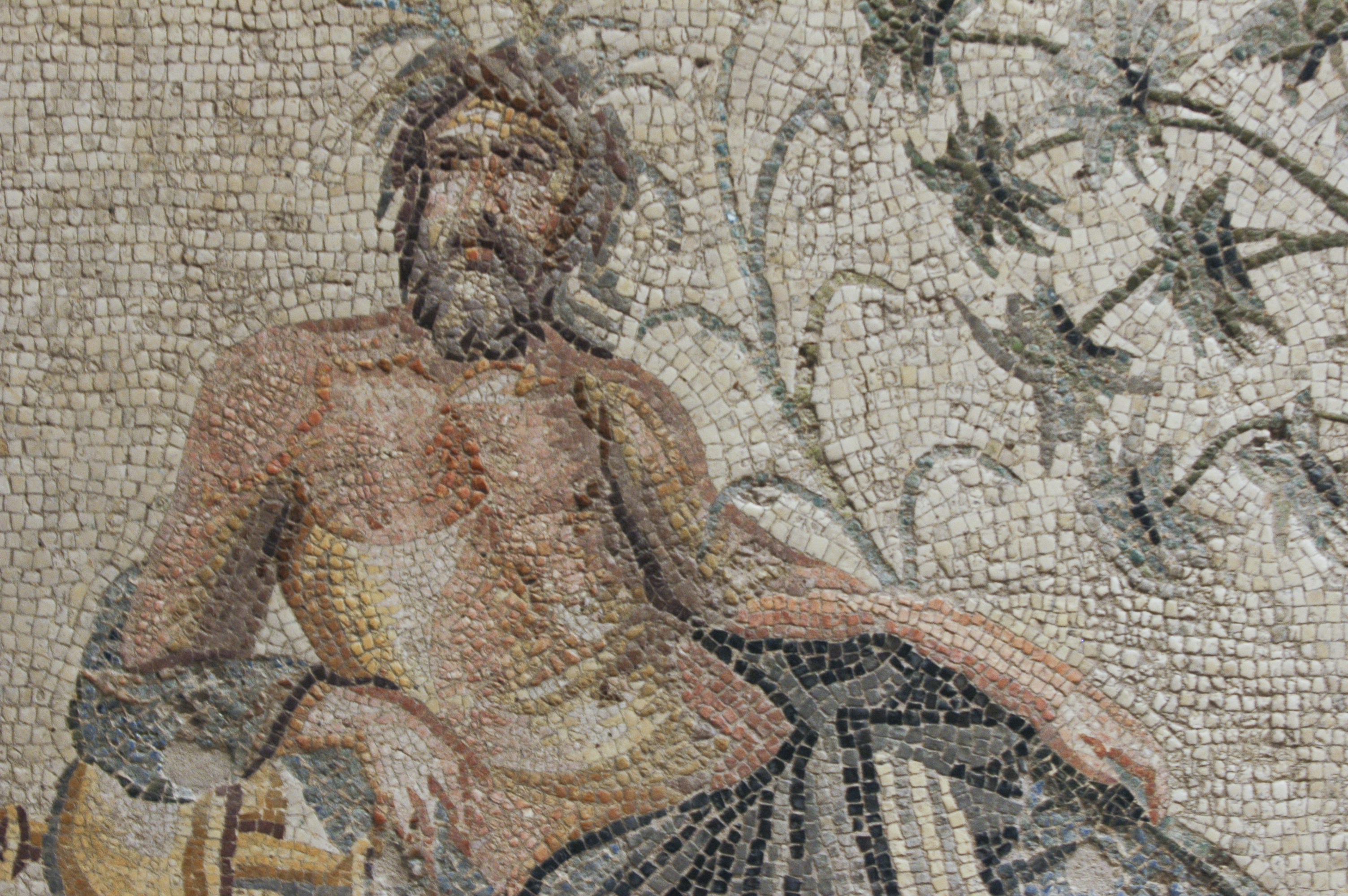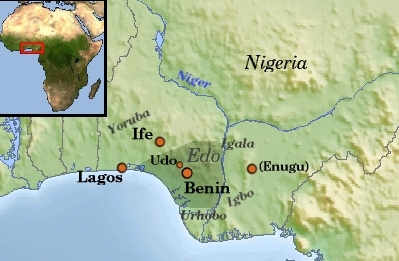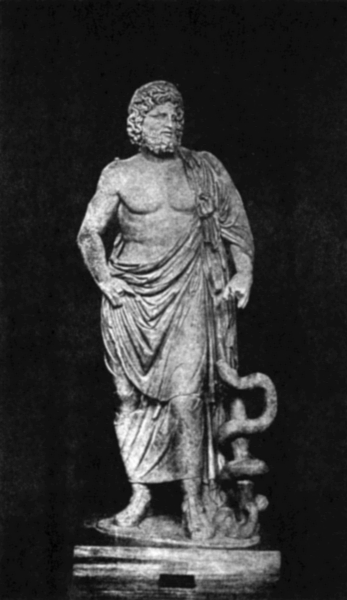|
Olokun
Olokun ( Yoruba: Olókun) is an orisha spirit in Yoruba religion. Olokun is believed to be the parent of Aje, the orisha of great wealth and of the bottom of the ocean. Olokun is revered as the ruler of all bodies of water and for the authority over other water deities. Olokun is highly praised for their ability to give great wealth, health, and prosperity to their followers. Communities in both West Africa and the African diaspora view Olokun variously as female, male, or androgynous. West Africa Water deities are "ubiquitous and vitally important in southern Nigeria"; Olókun worship is especially noted in the cities of the Yoruba and Edo people in southwest Nigeria. In West African areas directly adjacent to the coast, Olokun takes a male form among his worshipers, while in the hinterland, Olokun is a female deity. According to Yoruba traditions about their divine dynasty, Olokun - in her female incarnation - was the senior wife of Emperor Oduduwa. Her rivalry with one of ... [...More Info...] [...Related Items...] OR: [Wikipedia] [Google] [Baidu] |
Yoruba People
The Yoruba people ( ; , , ) are a West African ethnic group who inhabit parts of Nigeria, Benin, and Togo, which are collectively referred to as Yorubaland. The Yoruba constitute more than 50 million people in Africa, are over a million outside the continent, and bear further representation among the African diaspora. The vast majority of Yoruba are within Nigeria, where they make up 20.7% of the country's population according to Ethnologue estimations, making them one of the largest List of ethnic groups of Africa, ethnic groups in Africa. Most Yoruba people speak the Yoruba language, which is the Niger–Congo languages, Niger-Congo language with the largest number of native or L1 speakers. Geography In Africa, the Yoruba culture, Yoruba are contiguous with the Yoruboid languages, Yoruboid Itsekiri to the south-east in the northwest Niger Delta, Bariba people, Bariba to the northwest in Benin and Nigeria, the Nupe people, Nupe to the north, and the Ebira to the northeast in ... [...More Info...] [...Related Items...] OR: [Wikipedia] [Google] [Baidu] |
Yoruba Religion
The Yorùbá religion (Yoruba language, Yoruba: Ìṣẹ̀ṣe), West African Orisa (Òrìṣà), or Isese (Ìṣẹ̀ṣe), comprises the traditional religious and spiritual concepts and practice of the Yoruba people. Its homeland is in present-day Southwestern Nigeria and Southern Benin, which comprises the majority of the States of Nigeria, states of; Oyo State, Oyo, Ogun State, Ogun, Osun State, Osun, Ondo State, Ondo, Ekiti State, Ekiti, Kwara State, Kwara, Lagos State, Lagos and parts of Kogi State, Kogi in Nigeria, the Departments of Benin, Departments of; Collines Department, Collines, Ouémé Department, Oueme, Plateau Department, Plateau in Benin, and the adjoining parts of central Togo, commonly known as Yorubaland (). It has become the largest indigenous African tradition / belief system in the world with several million adherents worldwide. It shares some parallels with the Vodun practised by the neighbouring Fon people, Fon and Ewe people, Ewe peoples to its west ... [...More Info...] [...Related Items...] OR: [Wikipedia] [Google] [Baidu] |
Orisha
Orishas (singular: orisha) are divine spirits that play a key role in the Yoruba religion of West Africa and several religions of the African diaspora that derive from it, such as Haitian Vaudou, Cuban Santería and Brazilian Candomblé. The preferred spelling varies depending on the language in question: òrìṣà is the spelling in the Yoruba language, orixá in Portuguese, and orisha, oricha, orichá or orixá in Spanish-speaking countries. In the Lucumí tradition, which evolved in Cuba, the orishas are synchronized with Catholic saints, forming a syncretic system of worship where African deities are hidden behind Christian iconography. This allowed enslaved Africans to preserve their traditions under colonial religious persecution. According to the teachings of these religions, the orishas are spirits sent by the supreme creator, Olodumare, to assist humanity and to teach them to be successful on ''Ayé'' (Earth). Rooted in the native religion of the Yoruba people, mos ... [...More Info...] [...Related Items...] OR: [Wikipedia] [Google] [Baidu] |
Water Deities
A water deity is a deity in mythology associated with water or various bodies of water. Water deities are common in mythology and were usually more important among civilizations in which the sea or ocean, or a great river was more important. Another important focus of worship of water deities has been springs or holy wells. As a form of animal worship, whales and snakes (hence dragons) have been regarded as godly deities throughout the world (as are other animals such as turtles, fish, crabs, and sharks). In Asian lore, whales and dragons sometimes have connections. Serpents are also common as a symbol or as serpentine deities, sharing many similarities with dragons. Africa Akan * Bosompo, primordial embodiment of the oceans * Abena Mansa, sea goddess associated with gold * Ashiakle, goddess of the treasures at the bottom of the ocean *Tano (Ta Kora), god of the Tano river *Bia, god of the Bia river *Birim, goddess of the Birim river *Bosomtwe, antelope god of the Bos ... [...More Info...] [...Related Items...] OR: [Wikipedia] [Google] [Baidu] |
Orisha
Orishas (singular: orisha) are divine spirits that play a key role in the Yoruba religion of West Africa and several religions of the African diaspora that derive from it, such as Haitian Vaudou, Cuban Santería and Brazilian Candomblé. The preferred spelling varies depending on the language in question: òrìṣà is the spelling in the Yoruba language, orixá in Portuguese, and orisha, oricha, orichá or orixá in Spanish-speaking countries. In the Lucumí tradition, which evolved in Cuba, the orishas are synchronized with Catholic saints, forming a syncretic system of worship where African deities are hidden behind Christian iconography. This allowed enslaved Africans to preserve their traditions under colonial religious persecution. According to the teachings of these religions, the orishas are spirits sent by the supreme creator, Olodumare, to assist humanity and to teach them to be successful on ''Ayé'' (Earth). Rooted in the native religion of the Yoruba people, mos ... [...More Info...] [...Related Items...] OR: [Wikipedia] [Google] [Baidu] |
Bini People
The Edo people, also referred to as the Benin people, are an Edoid-speaking ethnic group. They are prominently native to seven southern local government areas of Edo State, Nigeria. They are speakers of the Edo language and are the descendants of the founders of the Benin Kingdom, Ogiso Igodo. They are closely related to other Edoid ethnic groups, such as the Esan, the Etsakọ, the Isoko and Urhobo as well as other southern ethnic groups. The names ''Benin'' and ''Bini'' are Portuguese corruptions, ultimately from the word ''Ubini'', which came into use during the reign of Oba (ruler) Ewuare, c. 1440. ''Ubini'' is an Edo word meaning 'livable', used by Pa Idu, the progenitor of the Edo state people, to describe the area found as a livable locale during their sojourn from lower Egypt. ''Ubini'' was later corrupted to ''Bini'' by the mixed ethnicities living together at the centre; and further corrupted to ''Benin'' around 1485, when the Portuguese began trade relation ... [...More Info...] [...Related Items...] OR: [Wikipedia] [Google] [Baidu] |
Edo People
The Edo people, also referred to as the Benin City, Benin people, are an Edoid languages, Edoid-speaking Ethnicity, ethnic group. They are prominently native to seven Edo South Senatorial District, southern Local government areas of Nigeria, local government areas of Edo State, Nigeria. They are speakers of the Edo language and are the descendants of the founders of the Benin Empire, Benin Kingdom, Ogiso Igodo. They are closely related to other Edoid languages, Edoid ethnic groups, such as the Esan people, Esan, the Etsakọ people, Etsakọ, the Isoko language, Isoko and Owan, Urhobo as well as other southern ethnic groups. The names ''Benin City, Benin'' and ''Bini'' are Portuguese people, Portuguese corruptions, ultimately from the word ''Ubini'', which came into use during the reign of Oba of Benin, Oba (ruler) Ewuare, c. 1440. ''Ubini'' is an Edo State, Edo word meaning 'livable', used by Pa Idu, the progenitor of the Edo state people, to describe the area found as a livable ... [...More Info...] [...Related Items...] OR: [Wikipedia] [Google] [Baidu] |
Brazil
Brazil, officially the Federative Republic of Brazil, is the largest country in South America. It is the world's List of countries and dependencies by area, fifth-largest country by area and the List of countries and dependencies by population, seventh-largest by population, with over 212 million people. The country is a federation composed of 26 Federative units of Brazil, states and a Federal District (Brazil), Federal District, which hosts the capital, Brasília. List of cities in Brazil by population, Its most populous city is São Paulo, followed by Rio de Janeiro. Brazil has the most Portuguese-speaking countries, Portuguese speakers in the world and is the only country in the Americas where Portuguese language, Portuguese is an Portuguese-speaking world, official language. Bounded by the Atlantic Ocean on the east, Brazil has a Coastline of Brazil, coastline of . Covering roughly half of South America's land area, it Borders of Brazil, borders all other countries and ter ... [...More Info...] [...Related Items...] OR: [Wikipedia] [Google] [Baidu] |
Candomblé
Candomblé () is an African diaspora religions, African diasporic religion that developed in Brazil during the 19th century. It arose through a process of syncretism between several of the traditional religions of West and Central Africa, especially those of Yoruba religion, the Yoruba, Bantu mythology, Bantu, and Gbe languages, Gbe, coupled with influences from Roman Catholicism. There is no central authority in control of Candomblé, which is organized around autonomous ''terreiros'' (houses). Candomblé venerates spirits, known varyingly as ''Orisha, orixás'', ''inkice'', or ''vodun'', which are deemed subservient to a transcendent creator god, Olorun, Oludumaré. Deriving their names and attributes from traditional West African deities, the ''orixás'' are linked with Roman Catholic saints. Each individual is believed to have a tutelary ''orixá'' who has been connected to them since before birth and who informs their personality. An initiatory tradition, Candomblé's member ... [...More Info...] [...Related Items...] OR: [Wikipedia] [Google] [Baidu] |
Health Deities
A health deity is a god or goddess in mythology or religion associated with health, healing and wellbeing. They may also be related to childbirth or Mother Goddesses. They are a common feature of polytheistic religions. List of health deities African * Jengu, water spirits that bring good fortune and cure disease * Waaq/Waaqa, sky god that was worshipped by the Somali and Oromo people before Islam and Christianity * !Xu, sky god of the Bushmen of southern Africa who is invoked in illness * Sonzwaphi, deity of healing, Zulu mythology Yoruba and Afro-American * Aja, spirit of the forest, the animals within it and herbal healers * Babalú-Ayé, spirit of illness and disease * Erinlẹ, spirit of abundance, the healer, and Physician to the Orisha * Loco, patron of healers and plants * Mami Wata, a pantheon of water deities associated with healing and fertility * Ọsanyìn, spirit of herbalism * Sopona, god of smallpox Albanian * Dielli, the Sun: giver of life, health and en ... [...More Info...] [...Related Items...] OR: [Wikipedia] [Google] [Baidu] |
Yoruba Deities
Yoruba may refer to: * Yoruba people, an ethnic group of West Africa * Yoruba language, a West African language of the Volta–Niger language family * Yoruba alphabet, a Latin alphabet used to write in the Yoruba language * Yoruba religion, West African religion * Yorubaland Yorubaland () is the homeland and cultural region of the Yoruba people in West Africa. It spans the modern-day countries of Nigeria, Togo and Benin, and covers a total land area of . Of this land area, 106,016 km2 (74.6%) lies within Niger ..., the region occupied by the Yoruba people * ''Yoruba'' (spider), a genus of ground spiders See also * {{Disambiguation Language and nationality disambiguation pages ... [...More Info...] [...Related Items...] OR: [Wikipedia] [Google] [Baidu] |






